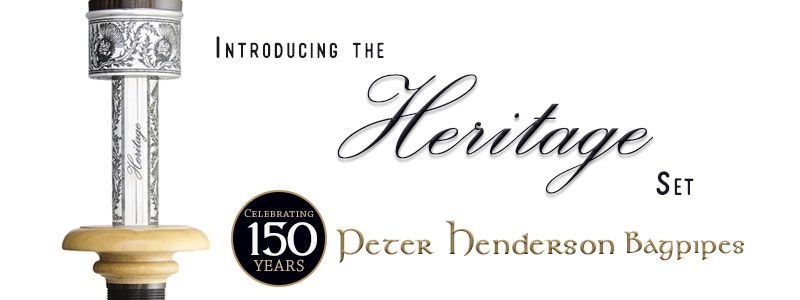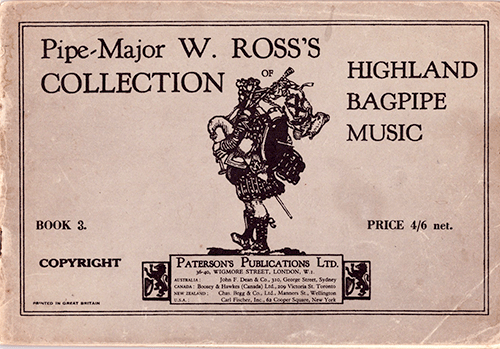
By The Editor
A couple of days ago we reported on the 1938 spat between DR MacLennan and an Oban Times reviewer (anonymous) who had the temerity to question GS McLennan’s predilection for G gracenotes on birls at the ends of marches.
The subject of the review was P/M Willie Ross’s Book 3, first published that year. There are some other interesting points of information in the text and we thought we should re-run them for you. Before that, however, we have part of a personal letter Malcolm MacPherson, grandson of Calum Piobair, wrote to DR a few weeks after the publication of the article. It is typed, is dated 19th January, 1939, and addressed as from Achany-Ullapool Estates, Inveran, Invershin, Sutherland:
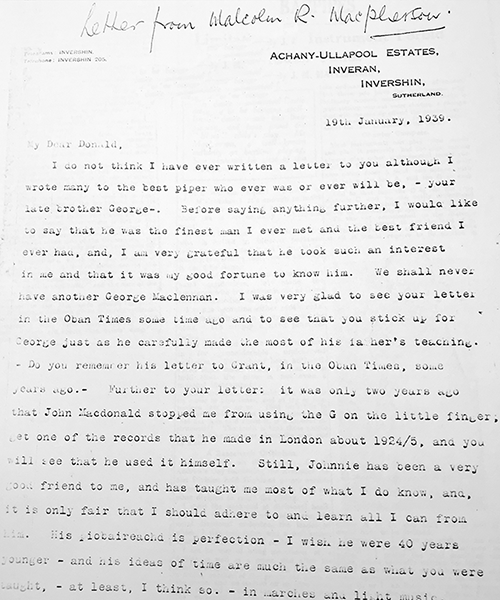
It reads: ‘My Dear Donald, I do not think I have ever written a letter to you although I wrote many to the best piper who ever was or ever will be – your late brother George. Before saying anything further, I would like to say that he was the finest man I ever met and the best friend I ever had, and I am very grateful that he took such an interest in me and that it was my good fortune to know him. We shall never have another George MacLennan [sic].
‘I was very glad to see your letter in the Oban Times some time ago and to see that you stick up for George just as he carefully made the most of his father’s teaching – do you remember his letter to Grant [Rothiemurchus] in the Oban Times some years ago.
‘Further to your letter, it was only two years ago that John MacDonald [Inverness] stopped me from using the G [gracenote] on the little finger. Get one of the records that he made in London about 1924/5 and you will see that he used it himself.
‘Still, Johnnie has been a very good friend to me, and has taught me most of what I know, and it is only fair that I should adhere to and learn all I can from him. His piobaireachd is perfection – I wish he were 40 years younger – and his ideas of time are much the same as what you were taught – at least I think so – in marches and light music.
‘I am hardly touching the pipes and have been very busy since October….’
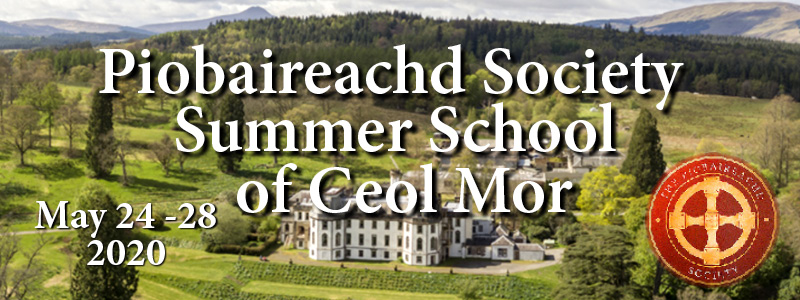
Now excerpts from the review: ‘A new book by such a master as Pipe Major William Ross, Edinburgh Castle, is sure of a welcome from all who are interested in the national instrument. The present publication…..contains 21 marches, six strathspeys, 11 reels and six jigs.
‘It is interesting to find on the first page a recent and pleasing tune by John MacColl of Oban whose eminence also requires no description, and who at the present day is perhaps the most popular of composers.
‘The tune, King George VI’s Welcome to Edinburgh, 1937, is severely orthodox in form like all John MacColl’s compositions, yet at the same time more intricate than some of his earlier work such as the Argyllshire Gathering and Arthur Bignold of Lochrosque. ‘
[This tune was excised from later editions of Book 3 in much the same way MacColl had his tune Mrs John MacColl removed from Ross’s Book 1 – a dispute over copyright. It is surprising that Ross’s publisher, Paterson, made the same mistake twice.]
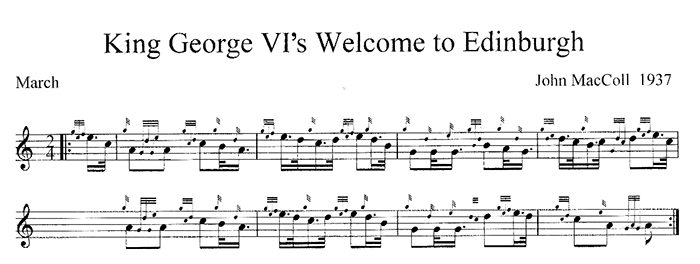
‘Most of the other marches are also of the ‘competition’ pattern and are an interesting selection, typifying the various stages of the history of this form of pipe music….Three of the newer tunes may be pointed out as likely to please most people. These are Colin Thomson by the late Roderick Campbell, Benderloch Bay by D Maclean and Lewis F Beaton by W Ferguson.
‘Working backward from there to the end of the last century we find a good setting of Colonel Davidson, a tune composed in Canada by Robert Ireland. A little earlier comes DA Campbell’s Dunvegan Castle, much admired when it came out, but thought then a little too difficult for competitor’s lists.
‘Further back to the 80s belong Parker’s Welcome to Perthshire (presented here in a very nice setting) and that sterling tune, John Connon’s Ross-shire Volunteers. To an earlier peried still belong the well known Donald Cameron and the Duchess of Edinburgh and perhaps the Duke of Roxburgh’s Farewell to the Blackmount. What, by the way, is the real relationship between it and Miss Forbes’s Farewell to Banff, published by Ross, the Queen’s piper, in 1885?
‘Three other tunes belonging probably to the same early days, are well worthy of being heard oftener than they are: Captain Campbell of Glendaruel (also printed by the other William Ross), the MacNeills’ March, and Captain Campbell of Drum a Voisk by D Galbraith, an Islay pupil of Angus MacKay…. ‘

